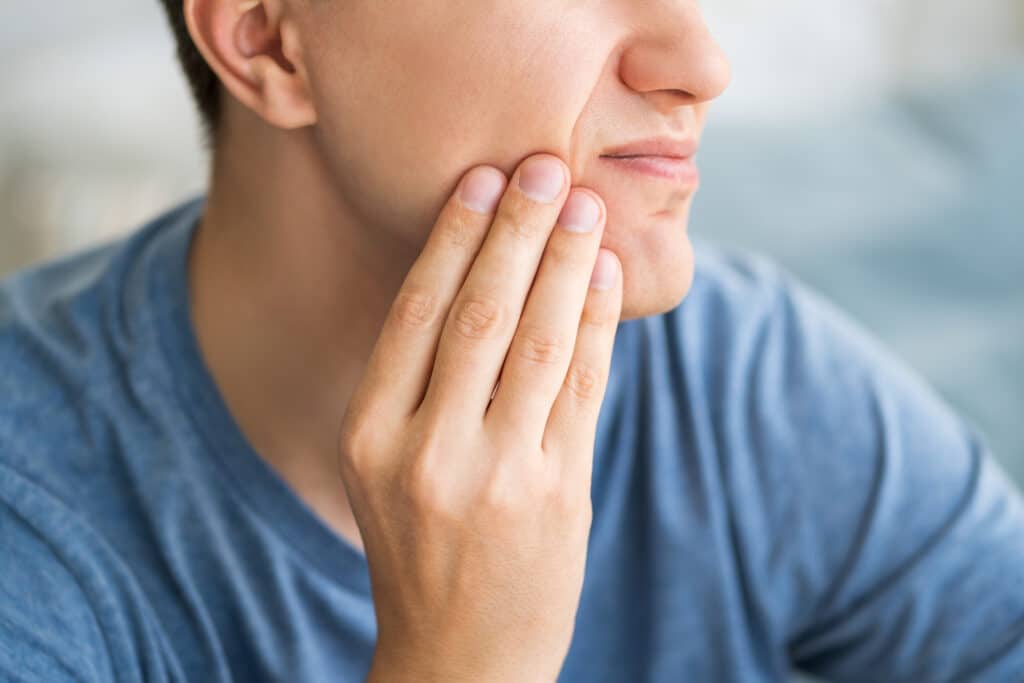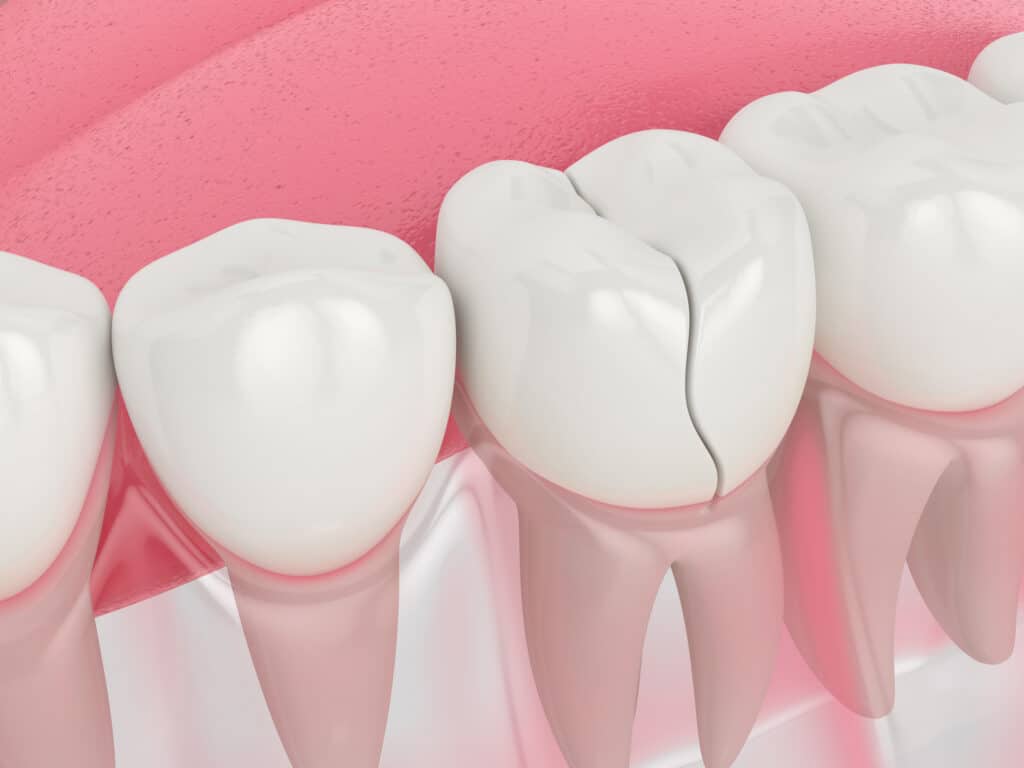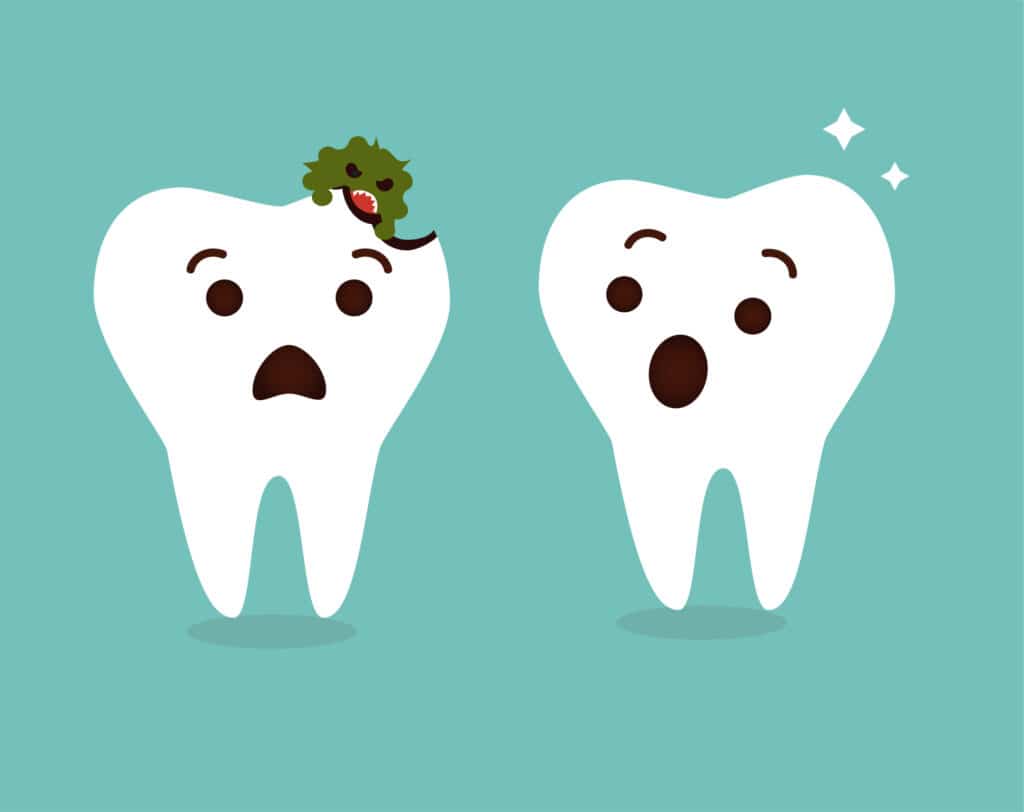
If you’re experiencing tooth pain at night, you might find it hard to get a good night’s rest. This can affect every other part of your day. Uncovering the causes of tooth pain at night and resolving them can protect your oral health and also improve your life. There are several reasons why your teeth or gums might hurt more at night, and understanding the cause is the first step to finding relief.
7 Possible Causes and Solutions of Tooth Pain at Night
1. Bruxism (Nighttime Teeth Grinding)
One of the most common causes of tooth pain at night is bruxism, or nighttime teeth grinding. Many people clench or grind their teeth while sleeping, often without realizing it. Over time, this can wear down your tooth enamel, cause sensitivity, and lead to jaw pain.
Stress is a major factor causing bruxism, and you might notice your teeth grinding often worsens during periods of anxiety or tension. If you wake up with a sore jaw, aching teeth, or a dull headache, bruxism may be the culprit.
A nighttime mouth guard is a great solution for this cause of tooth pain. A mouth guard can help cushion your teeth and reduce the impact of grinding. These are available over the counter you can get a custom-fitted guard from your dentist, which is specially fitted for your teeth. Reducing stress through relaxation techniques, such as meditation or breathing exercises may also help lessen grinding. If bruxism is severe, your dentist may recommend other treatments, such as adjusting your bite or using muscle relaxants.
2. Cavities and Tooth Decay
Cavities are another common cause of nighttime tooth pain. Some cavities can go unnoticed for long periods, but more advanced cavities can also cause pain. Cavities develop when bacteria break down tooth enamel, leading to sensitivity and sharp or throbbing pain.
As you go about your day, you might not notice the pain as much because you’re distracted with other things. However, when you lie down at night, increased blood flow to the head can make the pain feel more intense.
If you suspect a cavity, schedule a dental appointment as soon as possible. The best solution for a cavity is a filling, which a dentist can provide. In the meantime, over-the-counter pain relievers, such as ibuprofen, can help manage discomfort. Brushing twice daily with fluoride toothpaste can also slow the progression of tooth decay, as can avoiding sugary foods and drinks.
3. Tooth Infection or Abscess
A tooth infection or abscess can cause severe, persistent pain that worsens at night. This occurs when bacteria enter softer tissues inside the tooth or under the gums, leading to swelling and pressure buildup. A tooth infection may cause a sharp, throbbing pain that radiates to the jaw or ear. Other signs include swelling, sensitivity to hot or cold, and a bad taste in your mouth.
A tooth infection requires immediate dental care. A tooth infection is likely to spread if it isn’t treated, which can seriously endanger your health. A dentist may prescribe antibiotics to control the infection and recommend a root canal or extraction if necessary. In the meantime, rinsing your mouth with warm salt water can help reduce inflammation. Keeping your head elevated while sleeping may also minimize pressure and discomfort.
4. Cracked or Chipped Tooth

If you have a chipped or cracked tooth, the best solution is to visit your dentist. Your dentist can assess the damage and recommend treatment, such as bonding or placing a crown. They can also help you uncover the reason your teeth are chipping and how you can prevent further chips or cracks.
Until you can visit the dentist, you can care for your damaged tooth by avoiding hard foods and using a desensitizing toothpaste. If a sharp edge is causing discomfort, dental wax can temporarily smooth the area.
5. Tooth Sensitivity from Receding Gums
Gum recession exposes the parts of your teeth which aren’t covered by enamel, making them more vulnerable to pain, especially when exposed to cold air, hot drinks, or acidic foods. At night, temperature changes or dry mouth can make this sensitivity more noticeable.
Using a toothpaste designed for sensitive teeth can help preserve your tooth enamel and reduce discomfort. A soft-bristled toothbrush can also prevent further irritation. Receding gums can also be caused by gingivitis or periodontal disease, which your dentist can help treat.
6. Cuts or Sores in the Mouth
A cut on the gums, tongue, or inside of the cheek can cause lingering pain, especially if it’s irritated by food or drinks. Sometimes, sharp foods or accidental bites can create small wounds that take time to heal. If you’ve had dental surgery, such as wisdom tooth removal, these incisions will need time to heal, and can cause irritation or pain if they aren’t kept clean.
Keeping cuts, sores, or incisions clean by rinsing with salt water can help prevent infection and promote healing. Avoiding spicy or acidic foods can also prevent further irritation. If the pain persists for more than a few days, a dentist can check for underlying issues, such as an infection or a sharp tooth edge that may need smoothing.
7. Sinus Pressure and Tooth Pain
Sometimes, tooth pain at night isn’t actually caused by a dental issue at all. Sinus infections and congestion can put pressure on the upper teeth, leading to discomfort that worsens when lying down. This is because the sinuses are located near the roots of the upper molars, and inflammation can create a sensation of deep tooth pain.
Treating the underlying sinus infection with decongestants, antihistamines, or steam inhalation can help relieve pressure and reduce tooth pain. Staying hydrated and using a humidifier at night may also help keep sinus passages clear.
Tooth pain at night can stem from a variety of causes. Identifying the source of your pain is the first step toward finding relief. While some issues can be managed with home remedies, persistent or severe pain should always be evaluated by a dentist. If tooth pain at night is making it difficult for you to sleep, make an appointment with a dentist today. Patients in the Las Vegas area can schedule an appointment online or call 702-388-8888 to make an appointment

